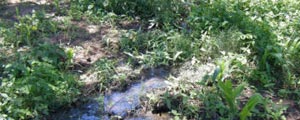
Harare residents are at risk of waterborne diseases due to lack of access to clean water and proper sanitation facilities, Human Rights Watch (HRW) has said.
CHIEF REPORTER
In a 60-page report yesterday titled Troubled Water: Burst Pipes, Contaminated Wells, and Open Defecation in Zimbabwe’s Capital, HRW described how residents have little access to potable water and sanitation services, and often resorted to drinking water from shallow, unprotected wells that were contaminated with sewage and to defecating outdoors.
The report is based on research conducted between 2012 and 2013 in Harare, the research included 80 interviews with residents, mostly women, in eight high-density suburbs.
“Harare’s water and sanitation system is broken and the government is not fixing it,” HRW Southern Africa director Tiseke Kasambala said. “In many communities there is no water for drinking or bathing, there is sewage in the streets, there is diarrhoea and typhoid and the threat of another cholera epidemic.”
The conditions violated the right to water, sanitation, and health, according to the report.
In 2008, over 4 000 people died and 100 000 fell sick countrywide following a cholera outbreak.
HRW said the conditions that caused the previous epidemic still existed in Harare’s high-density suburbs.
- Chamisa under fire over US$120K donation
- Mavhunga puts DeMbare into Chibuku quarterfinals
- Pension funds bet on Cabora Bassa oilfields
- Councils defy govt fire tender directive
Keep Reading
According to the report, residents complained that they were charged for water by the municipality even if council was failing to regularly supply them with the precious liquid.
Burst pipes also exposed residents to raw sewage, while water shortages and the lack of functioning indoor toilets or community latrines forced residents to defecate outdoors.
“We have one toilet for the whole house and there are 21 people who live here. The flushing system doesn’t work because there is no water, so we have to use buckets. When there is no water for flushing, we just use the bush,” one mother told the human rights body.
The report alleged that corruption and mismanagement at local and national levels of government have exacerbated the water situation.











